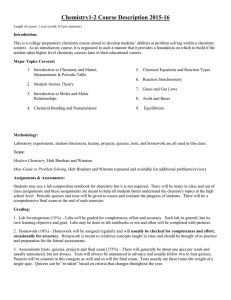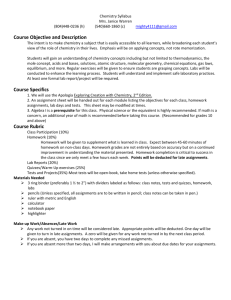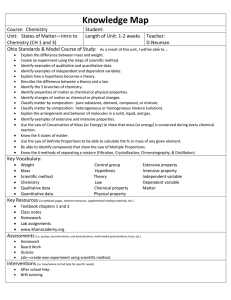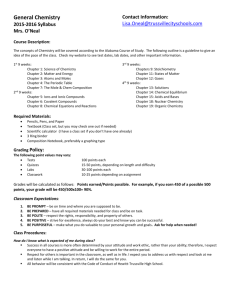Chemistry 11 Course Outline
advertisement
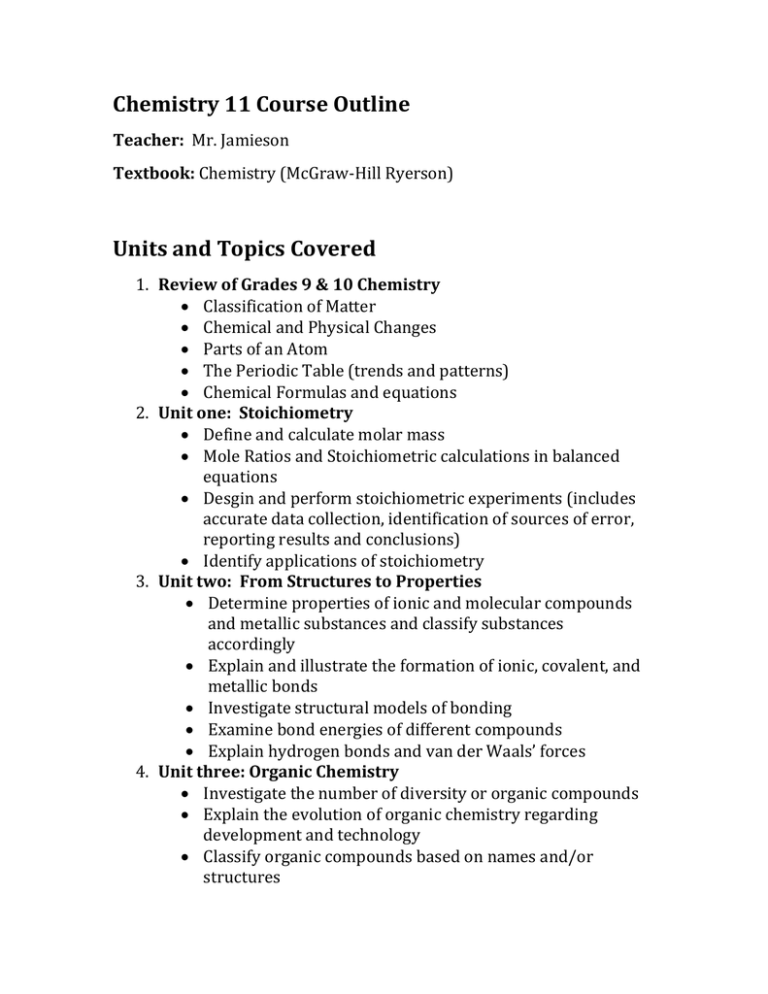
Chemistry 11 Course Outline Teacher: Mr. Jamieson Textbook: Chemistry (McGraw-Hill Ryerson) Units and Topics Covered 1. Review of Grades 9 & 10 Chemistry Classification of Matter Chemical and Physical Changes Parts of an Atom The Periodic Table (trends and patterns) Chemical Formulas and equations 2. Unit one: Stoichiometry Define and calculate molar mass Mole Ratios and Stoichiometric calculations in balanced equations Desgin and perform stoichiometric experiments (includes accurate data collection, identification of sources of error, reporting results and conclusions) Identify applications of stoichiometry 3. Unit two: From Structures to Properties Determine properties of ionic and molecular compounds and metallic substances and classify substances accordingly Explain and illustrate the formation of ionic, covalent, and metallic bonds Investigate structural models of bonding Examine bond energies of different compounds Explain hydrogen bonds and van der Waals’ forces 4. Unit three: Organic Chemistry Investigate the number of diversity or organic compounds Explain the evolution of organic chemistry regarding development and technology Classify organic compounds based on names and/or structures Write formulae and provide names of various organic compounds Determine applications of organic chemistry Investigate the formulae and reactions of Isomers Classify polymers and investigate their formation Explore the risks and benefits of the applications of organic chemistry Marking Scheme for Chemistry 11 Class work: 10% Lab Reports: 10% Assignments: 15% Quizzes: 15% Tests: 25% Final Exam: 25% Total: 100% Class Work: Class work will consist of Practice Problems and Worksheets assigned in class that you will have time to complete. All completed Practice Problems and Worksheets must be put in your Chemistry 11 duotang. The duotangs will be collected and marked accordingly. It is expected that you must show all steps for calculation questions and that all questions are answered in complete sentences. Marks will be lost if all work is not shown and/or sentences are not provided. Practice Problems are due the class after they are assigned. Working together is encouraged however copied work will be given a mark of zero. Lab Reports: You will be given a criteria heet to follow for all lab reports that you write. Lab activities will be conducted in groups selected by the teacher, however lab reports must be handed in individually. Copied lab reports will be given a mark of zero. Assignments: Assignments will be assigned prior to chapter quizzes or Unit tests in order to review the concepts that will be covered by the quiz or test. Projects may also be assigned throughout the course, and these are classified as assignments with regards to your grade in this course. Assignments will be longer and more detailed than class work and often time extra time will be needed in order to complete these. Due dates of assignments will be determined by the teacher but will be close to the dates of quizzes or tests. Again working together is encouraged however handing in identical work as a peer will result in a mark of zero. Quizzes: Quizzes will be given at the conclusion of a chapter and may be given throughout the chapter depending on length of chapter or if additional practice is needed. Tests: Tests are always given at the conclusion of a unit and may be given during Midterm Week if the conclusion of a unit is not near this week. Tests cover more material than quizzes and will be longer in length and duration. **** If you have missed an assessment please present a note stating the reason of your absence. Be prepared to complete the assessment the day you return to school. **** There will be one day a week to be determined where I will tutor after school from 3-4. It is not required to go to this session however it is strongly suggested that if you want extra help that you come to this session.


